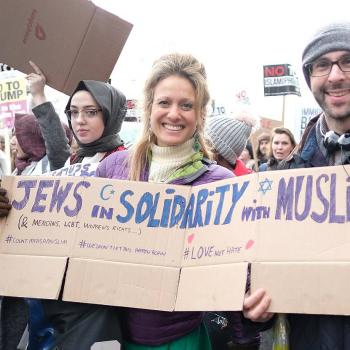 |
|
Now you notice me
|
Keith Ellison, a candidate for US Congress in Minnesota, overcame long odds (“He’s black! He’s Muslim! He didn’t pay parking tickets!”) to beat several qualified candidates in the Democratic primary on September 12th. Because his district is one of the bluest in the country, he is likely to win in November against Republican opponent Alan Fine and become the first ever Muslim member of Congress. Although Canada, the UK, and most European countries have had Muslims in their legislative bodies for some time, a win in America’s non-parliamentary system is extremely difficult for political minorities (witness the Green party). But then again, Ellison, to his credit and wisdom, never ran as a minority.
Though he always maintained that he was a man who lives his life “in a way not to make religion a big deal,” he is now getting a lot of attention from people, both non-Muslim and Muslim who want to do just that. In Ellison’s success, is there a lesson for Muslims in how to demonstrate their values to wider society without beating them on the head with proselytisation? And can non-Muslims return the favor of Ellison’s humility in not ascribing a religious fervor to the man that he obviously does not have?
Until now, the image of a Muslim getting involved in politics in the West has been to address Muslim concerns only and preach to everyone else. Muslim candidates often had little or no grassroots experience among the general electorate, and their campaigns were often an exercise in vanity. Well intentioned, perhaps, but myopic and counter productive. There are Muslim leaders (often self-proclaimed) and then there are leaders who happen to be Muslim. We are finally witnessing the ascendance of the latter.
But what does this say about the Muslim electorate? Chances are, if Muslims saw another candidate with Ellison’s stands on gay rights, abortion, and his suspiciously boiler plate platform on Israel, Iran, and the Middle East, they would not support him. Yet Ellison has the admiration of his Muslim constituents in the same way that a Muslim girl, Hammasa Kohistani, was spared much grief after her selection as Miss England, or that Yusuf Islam is confident enough to venture back into pop music. In other words, the notoriety supercedes the reservations. Beyond this, Muslims in the west should realize that they are seeing the face of future generations take shape, generations that might adopt cultural and political values that aren’t necessarily the same as their forebearers or against Islam as they choose to practice it.
Politically speaking, issues like equal rights for gays within a pluralistic society make sense when Muslims demand the same equal protection (the Muslim Council of Britain, who clashed with gays earlier this year, should take note). Ellison’s support for a two-state solution between Israel and Palestine is, after all, what the majority of those populations want. And Ellison’s opposition to Iran’s nuclear proliferation is a rational one if Muslims feel Israel should oblige as well. But all these relatively mainstream opinions have so far escaped the Muslim political discourse in favor of our own interests. That has kept Muslims from getting anywhere.
Ellison’s battle is, of course, not over. The increasing attention on his religion, driven mainly by right-wing websites, could swell the coffers of his long-shot opponent (as Georgia Congresswoman Cynthia McKinney experienced to her detriment this year). But Ellison is running as a candidate for all his district and reaching out to whites, African-Americans, and Jews, and this broad coalition will nearly guarantee a victory in November. Muslims should honor his success and follow his example by reaching out to fellow citizens where they live and where their broader interests coincide, not just to their fellow Muslims in isolation. And while we should be vigilant against the near certainty of baiting from Fine and his supporters, we must be careful not to make Ellison’s job harder than it is.
For example, much of the negative campaigning against Ellison since his victory has been due to the (mostly last minute) involvement by the Council on American-Islamic Relations. Though many of the charges against the organization or its officials are unfounded and/or separated from Ellison by many degrees, it is well understood that CAIR is a lightning rod when it comes to certain circles of politics. Due to the sensitivity of the situation, it may have been prudent for the group to keep a low profile. Though Ellison’s Democratic opponents steered clear of religion, Republican opponent Fine has used the increased political attention by CAIR and others to dredge up all sorts of unsavory Muslim stereotypes (such as calling Ellison an “extremist“). This was a relatively easy trap to stay out of.
Muslims are understandably proud of Ellison’s achievement, but while we celebrate, we must take another sobering look at reality. We have no more political power than we did the day before the primary, which is to say we have very little. Before we congratulate ourselves too much, we need to realize that Ellison deserves most of the credit. He worked very hard for many years to get where he is, all the while being unknown to most Muslims outside the Twin Cities. To be sure, Muslims helped in the way that any political supporters do, with donations, canvassing, and so forth. But as individuals, we helped no more so than Ellison’s non-Muslim constituents did, and as a group, far less so. The more we tout him as “the Muslim congressman” or “our candidate”, the more we inhibit Keith’s ability to do his job effectively. And having a member of Congress – one who just happens to be Muslim – that contributes positively is the best possible outcome. As Muslims, we need to get out of Keith’s way and let him do his job, and he can make our community proud in return.
Shahed Amanullah is editor-in-chief of altmuslim.com.















